Dry January 2024: 12 Brain Health Benefits of Quitting Alcohol
Are you “thinking” about participating in Dry January 2024 but can’t seem to focus? Here are 12 brain health benefits, along with expert secrets to quitting alcohol, in this brain health guide with Jonathan Bailor.
Take care of your brain health even more with our 14 Brain Foods to Improve Memory and Focus and 28 Daily Habits to Support Long-Term Brain Health at Every Stage guides next!
As the confetti settles and the festive echoes of the holiday season fade, many find themselves reflecting on the past month’s merriment. The holidays, for all their joy and togetherness, often bring an indulgence in rich foods and, quite commonly, alcohol. It’s a season of celebration, but sometimes our bodies—and particularly our brains—bear the brunt of this festive overindulgence.
Enter Dry January 2024—not just a trend, but a timely opportunity to hit the reset button on our health, especially brain health. This month-long journey of abstaining from alcohol is more than a fleeting New Year’s resolution; it’s a powerful step towards ending alcohol addiction and revitalizing our mental well-being. For many, particularly those who’ve enjoyed the holiday cheer a bit too enthusiastically, Dry January offers a welcome pause, a chance to allow the body, and specifically the brain, to recover and rejuvenate.
Alcohol abuse affects both physical and mental health. So, why are we focusing on the brain in this blog post? The brain is the command center of our body, intricately linked to every function and feeling. It’s a remarkable organ, deserving of care and attention. Alcohol, while often used as a social lubricant, can have profound and sometimes unrecognized effects on this vital organ. This month of January, a month when you stop drinking alcohol, provides an excellent opportunity to explore the positive changes that occur when alcohol is removed from the daily routine.
As you embark on this journey, it’s important to acknowledge the changes you might experience. Improved sleep quality, heightened mental clarity, and general well-being are just the tip of the iceberg. The benefits of abstaining from alcohol, even temporarily, can have a profound impact on various aspects of brain health. These benefits are not just fleeting changes but can be the starting point of a more sustainable, healthier lifestyle.
This article aims to illuminate the myriad ways in which a break from alcohol can enhance brain function and overall mental health. It’s not just about abstaining; it’s about understanding and embracing the myriad benefits that this month of mindfulness can bring. And remember, sharing this journey can be both inspiring and motivational. Whether through social media or a chat over a cup of herbal tea, spreading the word about the importance of reassessing one’s drinking habits can encourage others to join in and experience these benefits for themselves.
As we venture into Dry January, let’s do so with a sense of curiosity and openness, ready to embrace the numerous ways our brains and bodies can thank us for this well-deserved break. Here’s to a month of clarity, rejuvenation, and discovery in pursuing a healthier, happier you.
The Ripple Effects of Alcohol on the Brain: Understanding the Impact
As we navigate through Dry January, it’s essential to understand how alcohol and alcohol abuse affect our brains. This knowledge not only empowers us but also reinforces our commitment to this alcohol-free month.
Let’s explore the distinct changes that alcohol brings to our brains, both in the short and long term.
Short-Term Changes
- Mood Swings and Emotional Shifts: Alcohol initially acts as a stimulant, often leading to a temporary uplift in mood. However, this can quickly shift to feelings of depression as its depressant qualities take over.
- Reduced Inhibitions and Impaired Judgment: Even moderate alcohol consumption can cloud judgment and lower inhibitions, leading to decisions one might not make when sober.
- Memory Lapses: Alcohol can interfere with the brain’s ability to form new memories, leading to gaps in recall, commonly known as ‘blackouts.’
- Slowed Reflexes and Response Time: Alcohol depresses the central nervous system, leading to delayed reaction times and impaired coordination, which is why driving under the influence is so dangerous.
- Altered Sensory Perceptions: Even small amounts of alcohol can affect the senses, leading to blurred vision, slurred speech, and altered hearing.
- Sleep Disruptions: While alcohol might hasten the onset of sleep, it significantly compromises sleep quality, leading to a less restful night.
- Increased Risk of Accidents: The combination of impaired judgment, coordination, and reaction time significantly increases the likelihood of accidents and injuries.
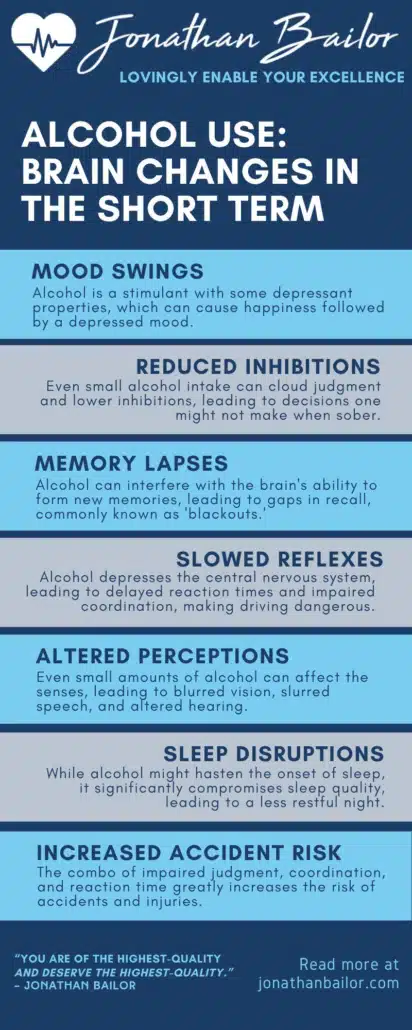
Feeling Better Is Priceless, That's Why We Don't Put A Price On It!
“It’s Like A Free and Medically Valid Version of Noom and Weight Watchers Online”
~ Dr. Doctor Matthew Oleshiak, MD
Click the 'LEARN MORE' button below for free lifetime access to the fast fix program developed by Jonathan and top Ivy League Medical Doctors
LEARN MOREP.S. It's not a free trial. It's not part of the program for free. The entire program is free, forever, for real! No credit card needed.
Long-Term Changes
- Risk of Brain Shrinkage: Chronic alcohol consumption can lead to a reduction in brain size, impacting its structure and function over time.
- Cognitive Decline: Prolonged alcohol use can result in diminished cognitive abilities, impacting memory, problem-solving skills, and the ability to think abstractly.
- Mental Health Issues: Long-term alcohol use is strongly linked to an increased risk of developing anxiety, depression, and other mental health disorders.
- Increased Risk of Stroke: Consistent heavy drinking can lead to high blood pressure, which, in turn, elevates the risk of stroke, which can cause significant brain damage and long-term health complications.
- Neurological Complications: Conditions like Wernicke-Korsakoff Syndrome, a type of brain disorder caused by a lack of thiamine, are linked to long-term heavy alcohol use.
- Dependency and Addiction: Prolonged alcohol use can lead to physical and psychological dependence, making it challenging to reduce consumption or abstain.
- Compromised Brain Plasticity: Chronic alcohol exposure can hinder the brain’s ability to change and adapt, affecting learning and neuroplasticity.
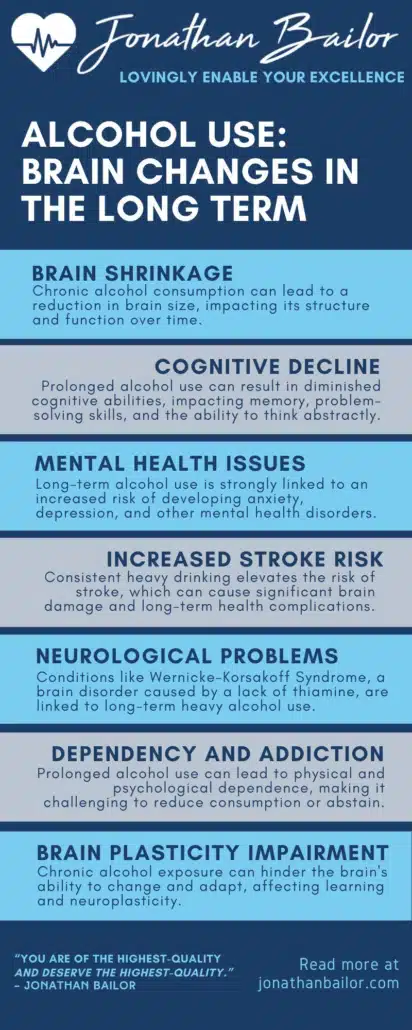
Understanding these changes underscores the importance of periods like Dry January. They are not just a break from alcohol but an opportunity to reset and recalibrate our brain health, leading to a path of wellness and vitality.
The 12 Brain-Health Benefits of Quitting Alcohol
Embracing an alcohol-free lifestyle, especially after a period of regular consumption, can be a transformative experience for your brain. This journey, while challenging, unlocks numerous benefits, each contributing to a healthier, more vibrant brain.
Here are 12 significant brain health benefits you can expect to experience when you participate in alcohol withdrawal, saying goodbye to alcohol.
1. Improved Cognitive Functions
Alcohol’s impact on cognitive abilities is well documented. Quitting alcohol allows your brain to restore its natural ability to process information, problem-solve, and make decisions. The fog of confusion that is often associated with regular drinking lifts, which leads to clearer thought processes and improved memory.
This renewed mental clarity enhances daily activities and professional performance, fostering a sense of accomplishment and confidence.
2. Enhanced Memory Retention
Alcohol can significantly impair short-term memory and, over time, harm long-term memory retention. When you quit drinking alcohol, it allows the brain to recover and rebuild these vital cognitive functions. Improved memory retention aids in learning new skills, recalling important information, and maintaining social connections, enhancing overall quality of life.
3. Boosted Neuroplasticity
Alcohol consumption can hinder the brain’s plasticity—its ability to adapt and change in response to new experiences. Quitting drinking alcohol reactivates the brain’s natural plasticity, enhancing your ability to learn, adapt to new situations, and recover from injuries more effectively.
4. Lower Risk of Mental Health Issues
Regular alcohol use is linked to an increased risk of developing mental health disorders such as depression and anxiety. By quitting alcohol, you reduce this risk significantly.
The balance in brain chemistry improves mood stability, fosters a positive outlook, and supports overall mental well-being.
5. Increased Brain Volume
Chronic alcohol consumption can lead to brain shrinkage. Abstaining from alcohol can halt and even partially reverse this process, leading to an increase in brain volume. This physical change is a sign of improved brain health and function.
6. Improved Sleep Quality
While alcohol can induce sleep, it severely disrupts the sleep cycle, particularly the REM (rapid eye movement) stage, which is crucial for cognitive functions and memory.
Quitting alcohol leads to more restful, uninterrupted sleep, which is essential for brain health and overall well-being.
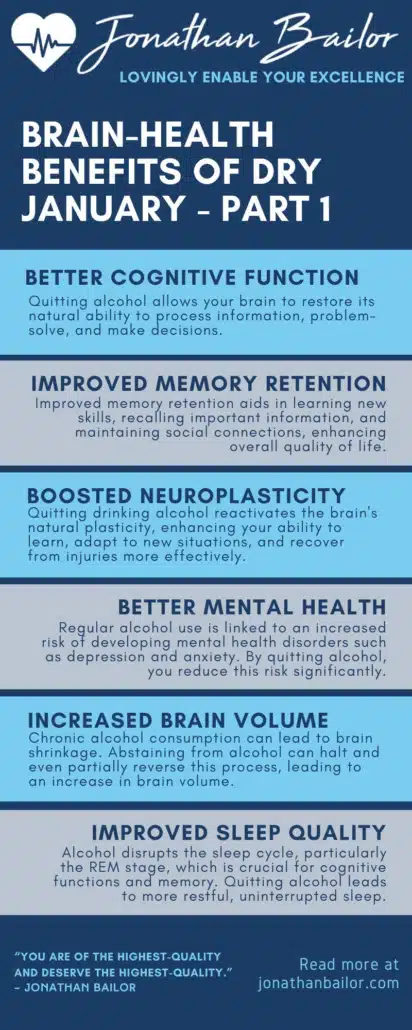
7. Sharper Concentration and Focus
Regular alcohol consumption can scatter your focus and concentration. Once you stop drinking, you’ll notice a significant improvement in your ability to concentrate on tasks, leading to increased productivity and efficiency in both personal and professional spheres.
8. Decreased Risk of Stroke
Chronic alcohol use increases the risk of stroke, which can cause long-lasting brain damage. By quitting alcohol, you significantly reduce this risk, thereby protecting your brain from potential debilitating effects.
9. Reduction in Brain Fog
Alcohol can create a persistent state of mental cloudiness, or ‘brain fog,’ making it difficult to think clearly. Abstaining from alcohol clears this fog, leading to sharper mental clarity and an enhanced ability to process information.
10. Improved Emotional Regulation
Alcohol can disrupt the brain’s ability to regulate emotions, often leading to mood swings and emotional instability. Quitting alcohol helps restore this balance, leading to more stable and predictable emotional responses.
11. Protection Against Neurodegenerative Diseases
Long-term alcohol use is associated with an increased risk of neurodegenerative diseases like Alzheimer’s and Parkinson’s. Abstaining from alcohol reduces this risk, contributing to long-term brain health and functioning.
12. Restoration of Brain Chemistry
Alcohol disrupts the delicate balance of neurotransmitters in the brain. Quitting alcohol allows these chemicals to return to their natural levels, improving mood, reducing cravings, and fostering a sense of well-being.
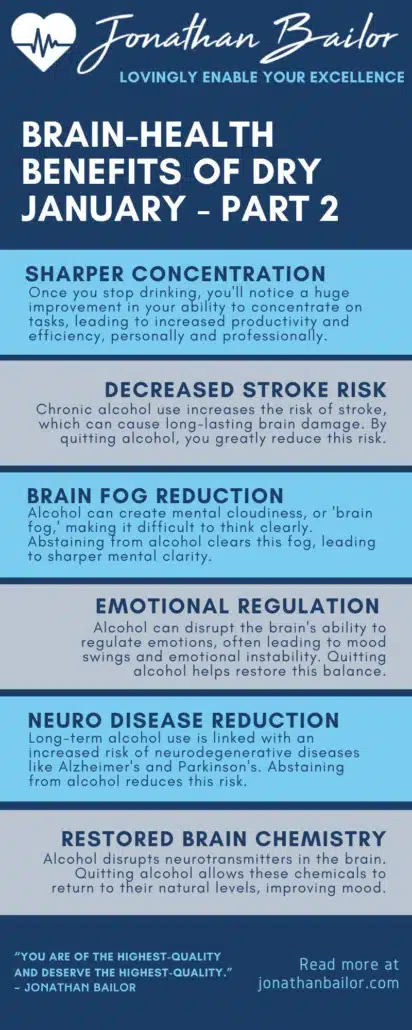
In summary, the decision to quit alcohol opens the door to a multitude of benefits for your brain.
Each benefit intertwines to create a tapestry of improved mental function, emotional stability, and overall brain health, laying the foundation for a fulfilling, vibrant life.
When to Seek Addiction Treatment
Recognizing when to seek addiction treatment is a crucial step in the journey toward recovery. If alcohol consumption or other substance abuse becomes a necessity rather than a choice, disrupts daily life, or leads to neglect of responsibilities, it’s a clear signal to seek professional help. Similarly, if attempts to reduce or stop drinking result in severe withdrawal symptoms or significant distress, this indicates a dependency that requires expert intervention.
Taking the step to seek treatment requires courage, but it is necessary to ensure support and guidance on the path to reclaiming control and well-being.
Navigating Dry January: 5 Strategies for Success
Embarking on Dry January is a commendable commitment that marks the beginning of a healthier year. While the journey can be challenging, particularly after the indulgence of the festive season, the right strategies can make it a rewarding experience.
These five tips are designed to help you successfully navigate this alcohol-free month, ensuring you reap the maximum benefits.
1. Set Clear Intentions
The decision to participate in Dry January must be anchored in strong, personal reasons. Whether it’s for health, mental clarity, or as a challenge, having a clear understanding of why you’re doing this can be incredibly motivating. Remind yourself of these reasons daily, especially during moments of temptation.
2. Create a Supportive Environment
Your environment plays a crucial role in your Dry January success. Start by removing alcohol from your home to avoid unnecessary temptation. Inform your friends and family about your commitment and seek their support. Surrounding yourself with people who respect and encourage your decision can make a significant difference. Additionally, avoid situations where drinking is the primary activity, especially in the early days when your resolve is still solidifying.
3. Discover Alcohol-Free Alternatives
One of the joys of Dry January is exploring activities that don’t involve drinking. There is a growing market for non-alcoholic beverages that mimic the taste of your favorite drinks. Experiment with mocktails, alcohol-free beers, and wines. These alternatives can satisfy the ritual of having a drink without the effects of alcohol, making social situations and relaxation times more manageable.
4. Engage in New Activities
Dry January is an excellent opportunity to try new activities or rekindle old hobbies. Activities that engage your mind and body can be particularly helpful in shifting focus away from alcohol. Whether it’s joining a fitness class, diving into a good book, or starting a creative project, these activities can fill the time you might have spent drinking, providing a sense of fulfillment and distraction.
5. Monitor and Celebrate Progress
Keeping track of your progress can be incredibly motivating. Mark each alcohol-free day on a calendar or use an app designed for tracking habits. Celebrate milestones with non-alcoholic treats or rewards, be it a week, two weeks, or the entire month. Recognizing and rewarding your efforts reinforces positive behavior and makes the journey more enjoyable.
Remember, Dry January is not just about abstaining from alcohol; it’s about making a positive change in your life. By setting clear intentions, creating a supportive environment, exploring alternatives, engaging in new activities, and monitoring your progress, you set yourself up for a successful and rewarding Dry January.
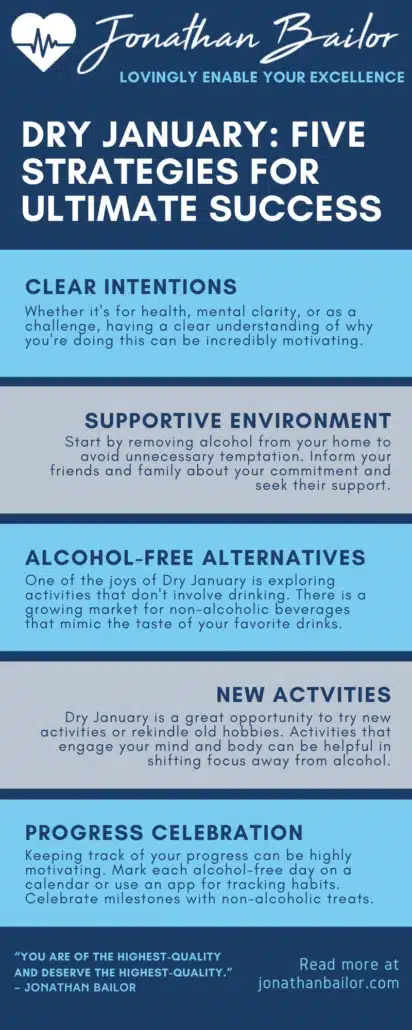
Brain Health Essentials: Your Questions Answered
Navigating the complexities of brain health can often lead to questions about the best practices and facts. Understanding how to maintain and improve brain health is crucial for overall well-being. Here are answers to five frequently asked questions about brain health, offering clarity and direction for those seeking to optimize their mental wellness.
Q1: What role does diet play in maintaining brain health?
Diet plays a pivotal role in brain health. Nutrients, notably those high in omega-3 fatty acids like fish, flaxseeds, and walnuts, support brain function. Antioxidant-rich fruits and vegetables combat oxidative stress, which can damage brain cells. Additionally, foods high in vitamins B, C, and E and minerals like magnesium and zinc are essential for cognitive function and overall brain health. A balanced diet not only fuels the brain but also helps prevent cognitive decline.
Q2: How does sleep affect the brain?
Sleep is crucial for brain health. During deep sleep, the brain performs critical functions like consolidating memories and clearing out toxins that accumulate during waking hours. Lack of sleep can impair cognitive abilities, affect decision-making, and increase the risk of neurological disorders. Consistently getting 7-9 hours of quality sleep each night is essential for maintaining cognitive function and overall brain health.
Q3: Can physical exercise improve brain health?
Yes, physical exercise is highly beneficial for the brain. Regular physical activity increases blood flow to the brain, which enhances its health and function. Exercise also stimulates the production of neurotrophins, which support neuron growth and connectivity. Activities like aerobic exercise, strength training, and yoga not only improve brain function but also reduce the risk of cognitive decline and neurodegenerative diseases.
Q4: Are brain-training games effective in enhancing brain health?
Brain-training games can be beneficial for the brain, particularly in improving specific cognitive skills like memory, problem-solving, and reaction time. However, their effectiveness varies from person to person. These games are most beneficial when combined with other brain-healthy habits like physical exercise, a balanced diet, and social interaction. While they can be a fun and stimulating way to engage the brain, they should not be the sole strategy for maintaining brain health.
Q5: How important is social interaction for brain health?
Social interaction plays a significant role in maintaining brain health. Engaging with others stimulates the brain and can improve mental functions like memory and attention. Social interactions also help in reducing stress and depression, both of which can adversely affect brain health. Regular social activities and maintaining a healthy social network are key components of a brain-healthy lifestyle.
Having a good understanding of these different elements of brain health can equip individuals with the information they need to make informed choices about their lifestyles. Embracing a holistic approach that includes a balanced diet, adequate sleep, regular physical and mental exercise, and social engagement is essential for maintaining optimal brain health.
Embracing a Healthier Mind: A Journey to Share
As we conclude this exploration of brain health and the transformative power of an alcohol-free lifestyle, it’s clear that the choices we make significantly impact our mental well-being.
Whether refusing to drink alcohol during January, improving dietary habits, or embracing healthier lifestyle choices, each step contributes to a vibrant, healthier brain.
Sharing this journey with friends and family can inspire and motivate them to embark on their own path to better brain health. So, spread the word on social media or via email, and let’s collectively embrace the journey to a healthier mind and a more fulfilling life.
Feeling Better Is Priceless, That's Why We Don't Put A Price On It!
“It’s Like A Free and Medically Valid Version of Noom and Weight Watchers Online”
~ Dr. Doctor Matthew Oleshiak, MD
Click the 'LEARN MORE' button below for free lifetime access to the fast fix program developed by Jonathan and top Ivy League Medical Doctors
LEARN MOREP.S. It's not a free trial. It's not part of the program for free. The entire program is free, forever, for real! No credit card needed.




